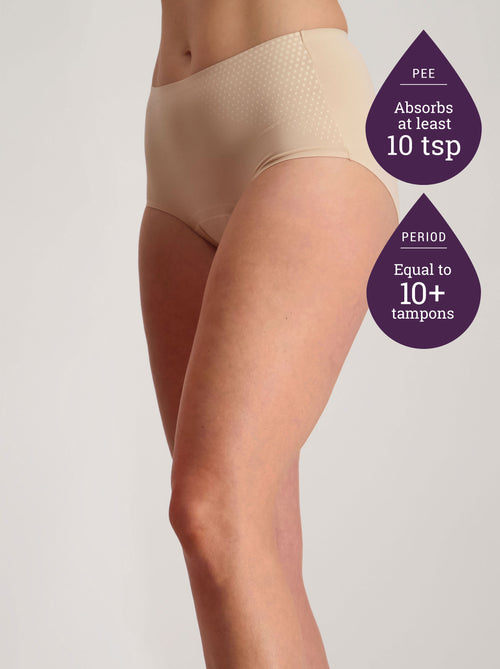Does your heart sink when your trainer calls for star jumps? Do you avoid lifting heavy weights? Does your golf swing make you anxious – especially towards the end of a round when you need to go to the loo?
If you leak a little while exercising, it’s likely that you’re experiencing stress incontinence. Stress incontinence happens when straining, lifting or jumping puts extra pressure on your bladder, which overrides the bladder sphincter’s ability to close and hold urine back. From a dribble to a puddle, the amount you leak depends on how full your bladder is at the time, the level of exertion and the strength of your pelvic floor muscles.
But the dilemma is that carrying excess body weight can make bladder leaks worse, and also exercise is really good for your mental and physical wellbeing – so there are lots of good reasons to try to keep active. Here are a few ways you can minimise the likelihood of little wee leaks while you’re exercising and feel confident that even if the worst does happen nobody else needs to know.
How to minimise leaks while exercising
Do kegel exercises as part of your routine
Want to control your little leaks? While you’re at the gym is a perfect time to do kegel exercises! These strengthen your pelvic floor, which is the area of tissues and muscles that act as a hammock to support the bladder, small intestine and rectum. When these muscles are strained or over-stretched your
bladder control
can be affected – but the good news is that, like any muscle, you can regain strength in this area. Not familiar with kegel exercises? Click here to find out how to do them.
Be careful what you drink beforehand
Coffee is a diuretic, which means it causes the bladder to increase urine production – so if you’re getting up early to go for a walk, save your coffee for afterwards. Similarly, if you’re jogging during your lunch break, avoiding a mid-morning coffee could be the difference between a leap and a leak.
Watch what you eat beforehand
Similarly to caffeine, spicy foods can trigger bladder leaks, so try to avoid foods that have even a small hint of spice before exercising. If you know you’ll be getting up early to exercise first thing, avoid spicy foods the night before.
See a pelvic floor specialist
Why not see a pelvic floor specialist or physio as part of your health and fitness plan? They can give you the best advice on strengthening the muscles required for bladder control, giving you more confidence when it comes to staying active and fit.
Stay hydrated
It might seem to make sense that the less water you drink, the fewer accidents you'll have – but the opposite is true. If you’re dehydrated, the liquid in your bladder becomes more concentrated and therefore more acidic, and this can make your bladder overactive as it tries to expel this extra acidity quickly, resulting in bladder leaks.
How to manage accidental leaks?
Still feeling anxious about exercise? Here are a few other tips and tricks...
Wear dark clothing
Bladder leaks are annoying enough, without worrying that other people will notice. Enhance your peace of mind by wearing dark clothing on your bottom half.
Focus on low-impact exercises
Take a break from high-impact exercises while you’re building up your pelvic floor strength. No, this isn’t an excuse to skip workouts! It’s simply an opportunity to switch it up while you focus on regaining bladder control. Instead of running, jumping and those pesky star jumps, try swimming, low-impact strength training and yoga.
Wear
purpose-designed underwear, just in case
Our underwear for men and women are perfect for catching little leaks while you’re exercising. Our patented absorbent leakproof textile technology quickly draws moisture away from your body, eliminates odour and provides a waterproof barrier between your body and your clothing. Plus, our fabrics are naturally breathable and designed to move when you do.
Mental and physical wellbeing are incredibly important when it comes to bladder control – so don’t let bladder leaks hold you back from health and fitness!






